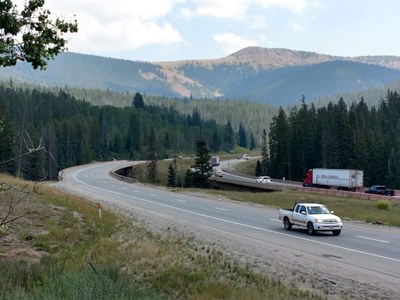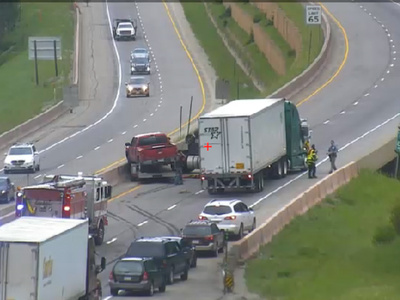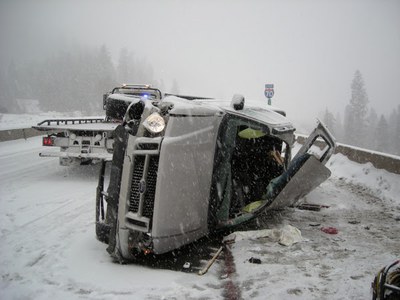CDOT Receives $60.7 Million in Federal Funding for Improving Vail Pass
News Release
DENVER — The Colorado Department of Transportation (CDOT) has won a $60.7 million Infrastructure for Rebuilding America (INFRA) grant from the U.S. Department of Transportation for significant improvements to Vail Pass on I-70. The funding will be used to construct an estimated $140.4 million project including an eastbound auxiliary lane, reconstructing the eastbound bridge over Polk Creek, shoulder widening, eastbound and westbound curve modifications, reconstruction of a truck ramp, dynamic message signs, a variable speed limit system, wildlife crossings, automated anti-icing technologies and will relocate two miles of the recreation path that is currently next to I-70. These improvements will take place on I-70 on the west side of Vail Pass, between Mile Points 180 and 190 in Eagle County.


Vail Pass is a dramatic and challenging section of I-70 in Colorado’s Rocky Mountains. Completed in 1979, the pass as we know it has struggled to keep up with Colorado's growing population and traffic, while still serving as an important connection in Colorado and the nation’s transportation network. Vail Pass is also subject to extreme weather and nature’s harshest elements. The resulting wear and tear and challenging driving conditions come at a cost: the crash rate on Vail Pass is the highest for all of I-70, per million vehicle miles traveled, with 558 crashes from 2014 to 2016. The INFRA grant will help save taxpayer dollars by helping reduce accidents and prevent costly detours. The estimated economic impact for detours is $1 million for every hour I-70 is closed.
“We appreciate the support of our Congressional delegation in helping us to secure funding for this tremendously important project — critical for commuters, travelers and the safe passage of freight through our beautiful I-70 mountain corridor, said CDOT Executive Director Shoshana Lew. "One of the core strategies of our state’s transportation plan is to focus investments on key arteries that move people and goods through our economy, like I-70. This grant will help us achieve that vision.”
"I-70 and Vail Pass in particular serve as an important gateway to outdoor recreation like hiking, biking, and skiing, and as a vital connector for trucks and freight movement,” said Sen. Michael Bennet. “I’m glad DOT has awarded CDOT this grant to make important safety upgrades and reduce the number of closures of West Vail Pass due to inclement weather and vehicle crashes. This $60.7 million grant is welcome news for Eagle and Summit Counties, and all who travel on I-70 to access outdoor recreation and our mountain communities.”

“Interstate 70 is an important economic driver in our state, but I’ve heard from countless Coloradans who are frustrated with congestion, unsafe driving conditions, and frequent closures due to weather events,” said Senator Cory Gardner. “That’s why I advocated for this funding to improve I-70 and am proud to have helped secure this grant of more than $60 million to improve the infrastructure that millions of Coloradans rely on. This funding will help facilitate improvements aimed at reducing the number of road closures and delays, making commutes more reliable and greatly improving the quality of life for the Western Slope.”
“I-70 is a key economic driver in the State of Colorado and a gateway to the recreation and tourism opportunities in Summit and Eagle Counties and mountain communities across the 2nd Congressional District,” said Congressman Joe Neguse. “However, we know too well that West Vail Pass is prone to closures due to weather events, as well as spin outs and crashes. Investments in safety and reliability in the I-70 corridor is essential to keep Coloradans safe and to continue to connect travelers east and west of the Continental Divide. I am grateful to see funding awarded to these projects, and look forward to continuing to advocate for Colorado’s highways and safety.”
CDOT applied for the grant in coordination with the Intermountain, Gunnison Valley, and Northwest Transportation Planning Regions (TPR), and the Grand Valley Metropolitan Planning Organization (MPO)/TPR. CDOT will provide a match to the INFRA grant of $79.7 million for a total cost of $140.4 million. Construction could begin as early as summer 2021.
REMEMBER: SLOW FOR THE CONE ZONE
The following tips are to help you stay safe while traveling through maintenance and construction work zones.
- Do not speed in work zones. Obey the posted speed limits.
- Stay Alert! Expect the unexpected.
- Watch for workers. Drive with caution.
- Anticipate lane shifts and merge when directed to do so
- Expect delays, especially during peak travel times.
- Allow ample space between you and the car in front of you.
- Avoid using mobile devices such as phones while driving in work zones.
- Turn on headlights so that workers and other drivers can see you.
- Be especially alert at night while driving in work zones.
- Be patient!
COVID-19
Safe transportation infrastructure is essential for emergency first responders and freight drivers as Colorado navigates the COVID-19 pandemic. With that in mind, construction continues on CDOT projects with social distancing and other health safety measures to reduce COVID-19 exposure on the worksite. The Colorado Department of Public Health and Environment announced guidelines for construction activities. The public is urged to join the campaign for #DoingMyPartCO and practice social distancing, wear face masks, stay at home when possible, and avoid nonessential travel. With fewer vehicles on the roads, CDOT crews will be able to work more efficiently and safely.
WHOLE SYSTEM. WHOLE SAFETY.
In early 2019, CDOT announced its Whole System — Whole Safety initiative to heighten safety awareness. This initiative takes a systematic statewide approach to safety combining the benefits of CDOT’s programs that address driving behaviors, our built environment and the organization's operations. The goal is to improve the safety of Colorado’s transportation network by reducing the rate and severity of crashes and improving the safety of all transportation modes. The program has one simple mission—to get everyone home safely.
